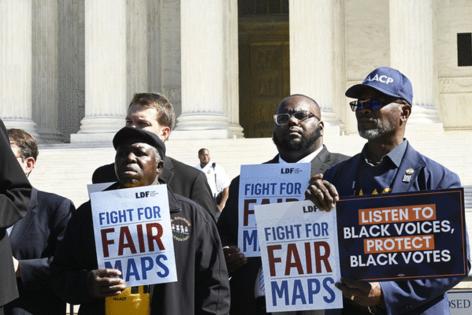Supreme Court backs South Carolina's congressional map
Published in News & Features
WASHINGTON — A divided Supreme Court on Thursday overturned a lower court ruling that found South Carolina had discriminated against Black voters when it drew its latest congressional districts.
The 6-3 decision found that the evidence did not support the lower court’s conclusion that state legislators had relied on race when they drew the district currently held by second-term Republican Rep. Nancy Mace. That allows the state to continue using the current seven congressional districts, drawn after the 2020 Census.
The majority opinion, written by Justice Samuel A. Alito Jr. and joined by the court’s Republican-appointed justices, said state legislators should receive the benefit of the doubt when faced with racial discrimination claims so litigants cannot “repackage” claims of partisan gerrymandering that the court has already said it will not decide.
A dissent from Justice Elena Kagan, joined by other Democrat-appointed justices, contends that the ruling will make it harder to prove racial discrimination in redistricting challenges.
Thursday’s decision reversed a three-judge lower court ruling which held that legislators had deliberately moved 30,000 Black residents from Charleston County out of the district to keep the population about 17 percent Black. The Republican-controlled legislature moved the voters from the district held by Mace to the district held by the state’s sole Democrat, Rep. James E. Clyburn.
The judges wrote that targeting Black voters in that way preserved the desired partisan tilt of the district in Republicans’ favor, and they ordered the state to draw a new map by last March. However, the redrawing was put on hold pending the Supreme Court appeal.
The Supreme Court rejected the factual findings of the lower court, writing that that the lower court’s conclusion that race predominated in the design of the map was “clearly erroneous.”
Alito wrote that the state should receive a “presumption of legislative good faith” and called claims of racial gerrymandering “weapons of political warfare” that are used to achieve partisan ends.
“The fact of the matter is that politics pervaded the highly visible mapmaking process from start to finish,” the opinion said.
State legislators had argued that they moved Black voters from one district to another to preserve the partisan balance of Mace’s district. Alito wrote that the lower court had made a mistake by inferring a racial motive rather than the stated partisan one.
...continued
©2024 CQ-Roll Call, Inc., All Rights Reserved. Visit cqrollcall.com. Distributed by Tribune Content Agency, LLC.







Comments